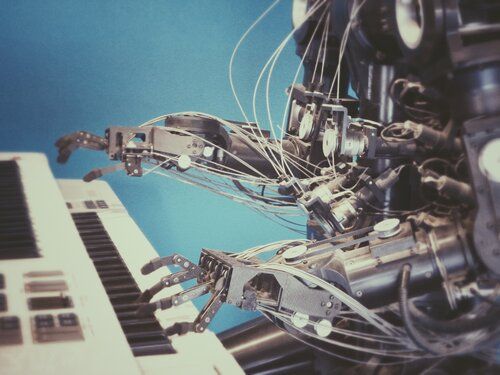office How technology will shape the future of work
It is a fact that innovation and new technology are fundamentally changing the way we live and do business. According to tech experts, these will continue to rock the modern workspace in the next decade - workstations will be unrecognisable to how they are set up today. Not to mention, workforce dynamics and the nature of work will change drastically in tandem with new technology.

To maintain relevance and earn a competitive edge, you need to know how emerging technologies will change the business environment. You should also think about how your business can leverage innovations to strategically attract top talent, boost efficiency, and improve your bottom line.
We have done the hard yards to have a look into the expected trends and how tech will affect your business in the future.
Technological Trends in Business & The Future of Work
These emerging technologies for business will play a key role in transforming your operations:
Internet of Thing (IoT)
We live in a digital age where almost everything is connected. From smart devices like sensors and appliances, the IoT is essentially a complex network of interconnected 'things'. This giant web of interconnectivity has changed the way we interact with our surroundings as well as how businesses build relationships with customers. From a business perspective, you shouldn't simply be 'jumping on the bandwagon' because all your competitors are using it - leveraging this source of technology should begin with a goal in mind, not the tech itself. What does your business want to achieve and how will this affect current operations? Importantly, how will you enhance system integration, data storage and security?

Blockchain
The adoption of this trend has the potential to boost data protection and cybersecurity. The digitally encrypted ledger groups data publicly in 'blocks.' It has a decentralised database that only allows 'chain' members to view or verify the info. This gets rid of go-betweens or the need to seek third-party validation. As a result, it will lead to more efficient financial transactions across borders and aid proper talent acquisition and management.

Automation and Artificial Intelligence (AI)
Automation and AI are fundamentally reshaping organisations and contributing to growth while enhancing productivity. Not only are these technologies transforming the workplace itself but also the nature of work. Repetitive tasks will be handled by machines and Robotic Process Automation (RPA) designed to perform with greater efficiency and accuracy. When tools like RPA are combined with document capture and management tools, huge gains in efficiency through automation are created This will create more opportunities for entrepreneurs, society, and the economy. While this may be a cause for concern regarding job redundancy, it actually means workers can focus on more meaningful tasks that grow revenue and deliver better customer experiences.
Virtual Reality (VR) and Augmented Reality (AR)
More than just technologies designed for gaming and the entertainment industry, we expect to see businesses increasingly adopt VR and AR as tools for workplace training, presenting, prototyping and designing. From the creation of 3D models to digitising the workplace, this innovation continues to unlock an extraordinary precedent and indefinite scaling potential. The virtual reality and augmented reality market is projected to grow to more than $120 billion by 2022, at a 75 percent compound average growth rate.

Cloud Technology Adoption
The rapid transformations in the digital world has led many businesses to venture into the cloud. In fact, your company may already be using some type of cloud service for relatively simple tasks like sharing and storing files or for analysing huge chunks of data. This innovation offers location and device independence, allows for offline accessibility of information, as well as scalability. To pursue a competitive advantage, your future employees must have the right skills to leverage this opportunity for maximum benefit to the business.
Software as a Service (SaaS), Desktop as a Service (DaaS) and Outsourced IT
With Cloud technology revenues predicted to grow past $278 Billion by 2021, Software as a Service (SaaS), Desktop as a Service (DaaS) and other cloud-based IT outsourcing models are changing the scope of work that companies manage internally. Leveraging the scalability and power of the cloud is delivering cost savings and efficiency gains to those willing to move to the cloud.
How these technology innovations will affect businesses and the future of work
Emerging technologies and innovations will not only boost efficiency across your organisation but will have even more long-term positive impacts. For instance, AI-enabled innovations designed to handle repetitive tasks, such as Robotic Process Automation (RPA), would open up new job opportunities and enable workers to focus on more meaningful work. Cloud computing, on the other hand, will lead to improved data management and security, while enhancing communications and access to information.
Highly efficient machines with AI integration could increase productivity while maintaining a manageable team of employees with optimal output.
Having grown up with the tech evolution, millennials and Gen Z job seekers are digital natives. They expect to work with companies with the latest and greatest tech advancements that enable a flexible and collaborative working atmosphere. Companies should stay ahead of the curve by staying up to date with the technological changes if you want to attract and retain the best talent.
Stay ahead of the game with us
With the changes in tech, you need to direct your focus on transforming your IT for you to stay ahead of time. Some crucial steps to take include moving to the cloud and adopting automation for most processes within the business.
We can set you up for the transformation, earning you a competitive edge. We will help you succeed by focusing on improving your IT as a business strategy. Not only will you improve your efficiency, but you also stand to increase productivity while enjoying the benefits of a scalable and contemporary IT system.
To learn more about how we can prepare you for future changes in tech, let's talk.